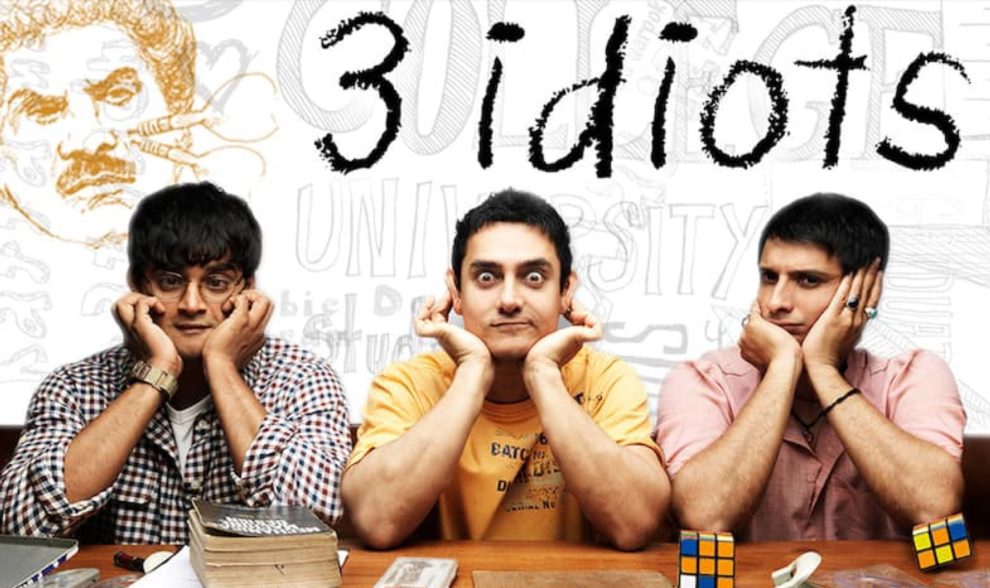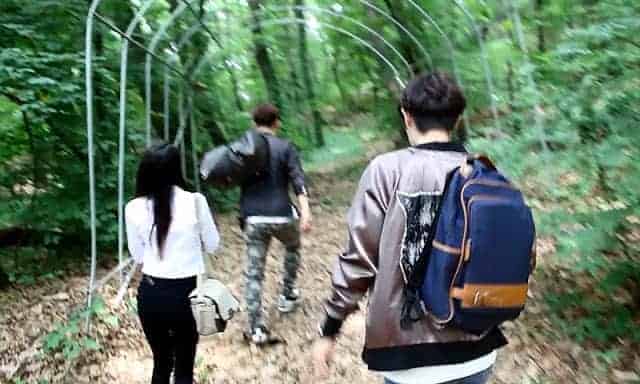by Eunice Tan
It has been over a decade since the release of “3 Idiots” and it still takes me on a rollercoaster ride of emotions. Set in the highly reputable (and fictional) Imperial College of Engineering (ICE), the film takes us through India's mentally invigorating education system amidst class inequality and immense societal and familial pressure. Our three idiots – Ranchoddas “Rancho” Shyamaldas Chanchad (Aamir Khan), Raju Rastogi (Sharman Joshi), and Farhan Qureshi (R Madhavan) navigate the all too familiar rat race with their uplifting motto “All is well”. Witty dialogues, comedic scenes and catchy tunes aside, this didactic film convinces us that life is more than just a race. Highly decorated with awards, the film establishes itself as one of the best in Hindi cinema and the region up till today.
Loosely based on Chetan Bhagat's Five Point Someone, “3 Idiots” depicts an intertwinement of two plotlines set in the past and present. Upon receiving a phone call from their college rival Chatur Ramalingam (Omi Vaidya), Farhan and Raju recount their college days while on the search for Rancho after he inexplicably vanishes after graduation. Gleaning into their past, the film shows us three main archetypes of engineering students in India – one who caved in to parental expectations, one who chases a piece of paper, and one who is passionate and eager to learn. While it is easy to match the characters to the different categories, paying attention to each character's lived experience, be it Farhan's dream of being a wildlife photographer or Raju's filial piety and determination to help his family overcome poverty, prevents us from being complicit in the negation of their identity and agency.
Besides bearing the brunt of old-fashioned teaching methods and rote learning, the engineers-to-be find themselves under the authority of their college director Viru Sahastrabuddhe (Boman Irani), nicknamed “Virus”. Virus is the embodiment of the rigid and orthodox education system, especially when he dignifies cruel competitions (such as those that contribute to suicide statistics). Rancho is Virus' polar opposite who also stands in stark contrast of the cohort and more significantly, Farhan and Raju. Unlike a vast majority who are held captive to society's unyielding stance that an engineering degree can buy them a stable future, Rancho's motivation is far more liberating. He simply wants to learn.
Under Rancho's intellect and humility, the trio embarks on roads less travelled, especially those that cross paths with Virus and his daughter Pia Sahastrabuddhe (Kareena Kapoor) whom Rancho falls in love with. Cherishing the opportunity to learn under the disguise of a rich man's son, Rancho exemplifies the idea that learning can take place anywhere. By actively applying what he has internalized in class, Rancho's grades surpass Virus' expectations and will later supersede Chatur's so-called “success”.
Watching Rancho put his knowledge to the test in critical life and death circumstances makes us question the product of the education system Virus was pining for. The film may have also acted as a mirror for viewers to reflect upon their learning attitudes and methods, interrogating our actual abilities to apply what we have learned from our books. Perhaps, many of us have longed to veer off the conventional tangent that does not always make economic sense and perhaps, it is at this juncture that we come to define success in our own terms. Otherwise, we may inevitably perpetuate a perverted standard of success, one that has forced many to their wits' end.
While Aamir Khan's portrayal of Rancho scores the film massive points, the character's overly simplistic solutions may have at times trivialized the struggles of his counterparts. With his impoverished family and severely ill father relying on his examination grades, Raju is understandably under immense stress – to the point where Rancho's optimism may appear as an inability to empathize rather than an encouragement. Still, we have to give Rancho credit for his relentless care towards Raju and his family, teaching us the importance of a strong support system amidst trying times.
Panning to the mise en scène of the film, the crew nailed the cast's outfits where they each represent the personality, socioeconomic status, and cultural background of their character. Not to mention, the bright colors and energetic choreography of the dance sequences almost mimic Rancho's happy-go-lucky outlook and embolden our spirits to match that of Rancho's.
Although “3 Idiots” is littered with the glitz and glamour of Bollywood characteristics and rib-tickling pranks, the lessons it espouses remain applicable especially in countries where mental disorders in students are on a rise. “3 Idiots” is ultimately a feel-good movie that reeks of hope even in the direst circumstances. While we may not always be able to overcome systems of power, the simple lie of “All is well” may be a placebo effect we never knew we needed to transcend difficult situations. The satisfying end to Rancho and Chatur's feud is definitely one that keeps me going back.
















